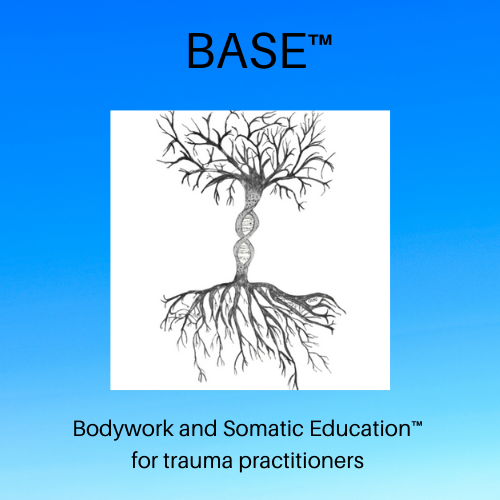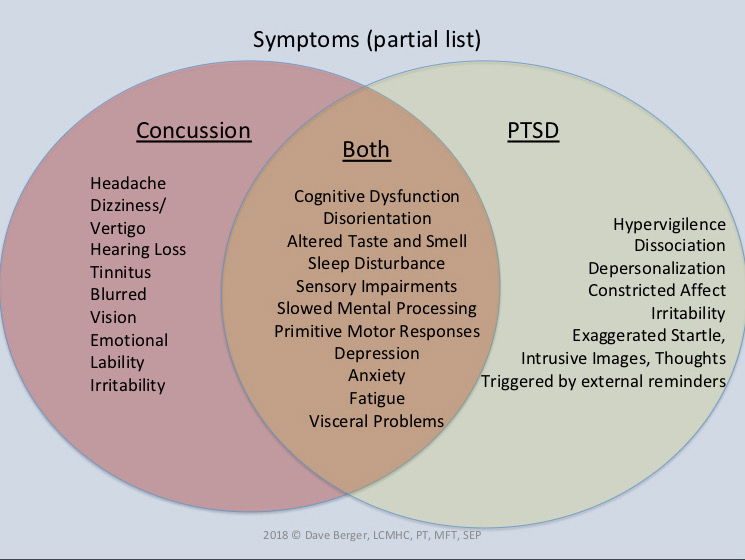Concussions and PTSD
A concussion is the result of a sudden physical assault to the skull and brain from trauma experiences such as abuse, accidents and sports. The rapidity can inhibit or yield inefficient normal protective responses that might prevent the physical assault. The inhibition is often caused by a sudden shock state or tonic immobility that is also seen in, and results in PTSD. Symptoms of PTSD and Post Concussive Syndrome (PCS) include cognitive disturbances, behavioral changes and relational disruptions. These, in turn, can lead to occupational, educational and activity of daily living problems. These symptoms can result from or exacerbate already existing challenges including domestic violence, military culture, leisure activities and occupational requirements.
When confronted with a physical threat such as can occur in domestic violence, motor vehicle accidents, sports and military activities we can go into flight, fight or freeze. Freeze, or tonic immobility, can result in PTSD.
Understanding the anatomy of the cranium, including the brain and its protective coverings gives us a basis for understanding the physical effects of a concussion on the brain. Polyvagal Theory gives a basis for understanding what happens neurologically and behaviorally that contributes to PTSD. This is a major contributor to cognitive and behavioral disturbances.
Clients and patients who have concurrent PTSD and PCS may need a team of practitioners in mental health and physical/medical health care. There may be some overlap that supports team work and it is important all practitioners have some idea of what each other does. The re-integration of cognitive health and autonomic regulation helps a client return to work re-engage in leisure activities and be more resilient in relationships.
The workshop includes lecture, experiential exercises, demo’s and practice time.
“When I went to see Dave it was like I was dying. When we were done I felt normal.” EB
Main points of this workshop include:
What is a concussion
PTSD and high impact injuries
Trauma healing and bodywork for concussions
Working with the cranium
Shock and somatic structures
Uncoupling shock trauma and post-concussive symptoms
Concussion as a Near Death Experience
Recognize similarities and differences between post concussive symptoms and PTSD
Learn strategies and interventions to treat Post Concussive trauma and PTSD
Therapeutic attunement
Clinically and ethically appropriate use of touch
Polyvagal theory and clinical application related to concussions
Bodywork/touch as a relational process
This is a stand alone workshop. Prior BASE training is not a pre-requisite.
For a detailed list of objectives and daily schedule, click here.
THE PELVIS: Structure, Power, Posture, Trauma
and Relational Intimacy
If you would like to sponsor this new workshop contact Dave
The pelvis, anatomically, joins the low back and the legs with its bowl shaped bone structure. It contains many organs including those for reproduction and elimination, muscles, ligaments, nerves and blood vessels.
However, it is much more than just that. And its functionality is much more than its anatomy. In many ways anatomically and functionally it is a ‘first cousin’ with the mouth, particularly the floor of the mouth and the joints of the jaw and the jaw itself. It holds the center of our body mass and the center of our power (true power of flow, ease and relaxation for clarity), it is the center from which we move and it is the first place we begin to develop self-control developmentally. The pelvis also holds a deep and important role in all kinds of intimacy and relational dynamics, not just sexual intimacy. We anchor through our pelvic floor.
When we are anxious, in fear, traumatized and feel out of control the pelvis is always involved. It is the structural, functional and relational base of our disempowerment, startle reflex and anxiety; our empowerment, softening and relaxation.
This workshop will focus on the relationship between the pelvis, the rest of the body, development, power and relational healing (not sexual healing or intimacy). It will be didactic and experiential so you will have some tools to use for anchoring, self-empowerment with soft ease and the beginning of relational and systems healing. At the present time the recording of the workshop is available to rent. Click below for more details. A live workshop is being developed.
For upcoming dates and registration information click here
Relational Development, Rupture and Repair™:
A Somatic Developmental Perspective of Attachment and Bonding
Developed and taught by: Dave Berger, MFT, PT, SEP, MA and Abi Blakeslee, CMT, MFT, Ph.D., SEP
Posture, movement, sensorimotor development and kinesiology are rarely understood as important features in human bonding. Yet, it is through movement and touch that self-regulation develops, dyadic bonding is learned and a sense of self grows.
Through lecture, experiential exercises and practice we will examine the primary structures of attachment and how shifting the structure can shift the relational field.
During the course, we will be exploring:
5 early primary structures of attachment
Developmental movement patterning
Polyvagal Theory in early relationship
Co-regulation, mirrored regulation and self-regulation
an overview of rupture and repair cycles
working somatically with couples and practice with Dyadic Somatic Tracking
Prior BASE training is not a requirement for this workshop.
To learn about the development of Relational Development, Rupture and Repair click here for an interview of Dave by Abi.
https://relationshiprepair.co
“I returned from my Rupture and Repair training feeling grounded in a clearer framework of how somatic principles could support my clients. I did not have to wait long to see the positive impact of Dave and Abi's teaching on my work. In my first session, I applied the clinical lens offered in the training, and my client - who is traditionally collapsed and easily overwhelmed - responded beautifully to this refined approach. I felt more at ease in our session and I sensed my client did, too. The training anchored me and my clinical work in a new way and thereby allowed a different process with my client.” Bethany Ackley DeBlaay, MA, LLPFor a detailed list of objectives and daily schedule, click here.
___________________________________________________________________________
Cancellation Policy
For all BASE trainings and specialty workshops if cancellation is 30 or more days prior to start date of a module or workshop there is a full refund less $50; 15-30 days prior to start date there will be 50% refund less $50. Less than 15 days prior to start date there is no refund. Payment can be by check, cash or online as specified on registration and information materials. Refunds need to be request from Dave Berger, dave@daveberger.net.
Deposits and Payment Plans
If you would like to make a deposit please contact the organizer.
Disability Access
If you require ADA accommodations please contact our office 30 days or more before the event. We cannot ensure accommodations without adequate prior notification.


